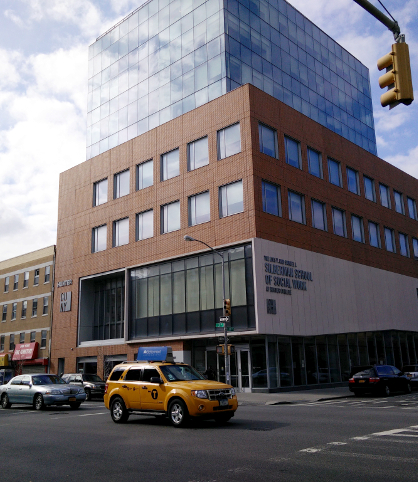Hunter and CUNY faculty analyze how cities can reduce diet-related diseases and food insecurity
April 23, 2015
What role can cities play in food policy? A new series of papers in the April issue of the British journal Public Health by Hunter College faculty and their international colleagues seeks to answer this question. The reports assess current efforts to reduce diet-related disease, obesity, and food insecurity in four world cities: New York City, London, Shanghai and Cape Town.
The articles grew out of a Fall 2012 Faculty Seminar on Municipal Food Policy led by Dr. Sue Atkinson, former adviser on health to the Mayor of London and the 2012-2013 Joan H Tisch Distinguished Fellow in Public Health at Roosevelt House Institute for Public Policy. The seminar was co-led by Nicholas Freudenberg, Distinguished Professor of Public Health at Hunter College and the City CUNY School of Public Health and faculty director of the New York City Food Policy Center at Hunter College
In an editorial introducing the articles, Atkinson and Freudenberg note that cities have become catalysts for change in social and public policy in part because they are home to more than half the world’s population and because they have demonstrated a capacity to innovate and challenge the status quo that national governments and international organizations sometimes lack.
In the special issue, three papers compare innovations and challenges in municipal food policy in New York with three other cities. Hunter Assistant Professor of Public Health (Nutrition) May May Leung and her colleagues in New York and China compare diet-related determinants of childhood obesity in New York and Shanghai, two cities with high rates of child obesity but very different social and economic policies. Dr. Kimberly Libman, formerly a post-doctoral fellow in Hunter’s public health program, Freudenberg and their colleagues at the University of Western Cape in Cape Town, South Africa, analyze the roles of urban food policy in preventing diet-related non-communicable diseases in Cape Town and New York. In another article, Freudenberg and Atkinson compare the role of food policy in the last two Mayoral elections in London and New York City and chart the rise of food policy as an electoral issue. Finally, three additional papers examine lessons from New York City for other municipalities. Hunter Professor of Urban Affairs Tom Angotti (who operates a farm in Brooklyn) asks how New York City’s experience in urban agriculture can inform policy here and in other cities. Emma Tsui, Assistant Professor of Public Health at Lehman College and the CUNY School of Public Health and her colleagues examine lessons for other cities from New York City’s institutional food program, which serves 260 million meals a year to some of the city’s most vulnerable populations. Finally, Libman asks whether food policy advocates have fallen into a “local trap” in which they inappropriately seek to solve at the neighborhood level food problems that have regional, national and global causes.
More information on the special issue on urban food policy of Public Heath, the official journal of the Royal Society for Public Health, is available here.
About the New York City Food Policy Center at Hunter College: The Center develops intersectoral, innovative and evidence-based solutions to preventing diet-related diseases and promoting food security in New York and other cities. It works with policy makers, community organizations, advocates and the public to create healthier, more sustainable food environments and to use food to promote community and economic development. Through interdisciplinary research, policy analysis, evaluation and education, we leverage the expertise and passion of the students, faculty and staff of Hunter College and CUNY. The Center aims to make New York a model for smart, fair food policy.
About the Roosevelt House Institute for Public Policy: Roosevelt House, an integral part of Hunter College since 1943, is a public policy institute honoring the distinguished legacy of Franklin and Eleanor Roosevelt. Its mission is to educate students in public policy and human rights, to support faculty research, and to foster creative dialogue. The institute provides opportunities for students to analyze public policy and experience meaningful civic engagement; for faculty to research, teach, and write about important issues of the day; and for scholarly and public audiences to participate in high-profile lectures, seminars and conferences.
For more information: contact Nicholas Freudenberg at nfreuden@hunter.cuny.edu
Full citations for articles:
Sue Atkinson, Nicholas Freudenberg. What role for cities in food policy? Public Health 2015; April, 129(4): 293-29.
N. Freudenberg, S. Atkinson. Getting food policy on the Mayoral table: a comparison of two election cycles in New York and London. Public Health 2015; April, 129(4):295-302.
E.K. Tsui, J. Wurwarg, J. Poppendieck, J. Deutsch, N. Freudenberg. Institutional food as a lever for improving health in cities: the case of New York City. Public Health 2015;April, 129(4): 303-309.
Kimberly Libman. Has New York City fallen into the local trap? Public Health 2015; April, 129(4): 310-317
M.M. Leung, H. Fu, A. Agaronov, N. Freudenberg. Diet-related determinants of childhood obesity in urban settings: a comparison between Shanghai and New York. Public Health 2015; April, 129(4): 318-326.
K. Libman, N. Freudenberg, D. Sanders, T. Puoane, L. Tsolekile. The role of urban food policy in preventing diet-related non-communicable diseases in Cape Town and New York. Public Health 2015; April, 129(4): 327-335.
T. Angotti. Urban agriculture: long-term strategy or impossible dream?: Lessons from Prospect Farm in Brooklyn, New York. Public Health 2015; April, 129(4): 336-34.



